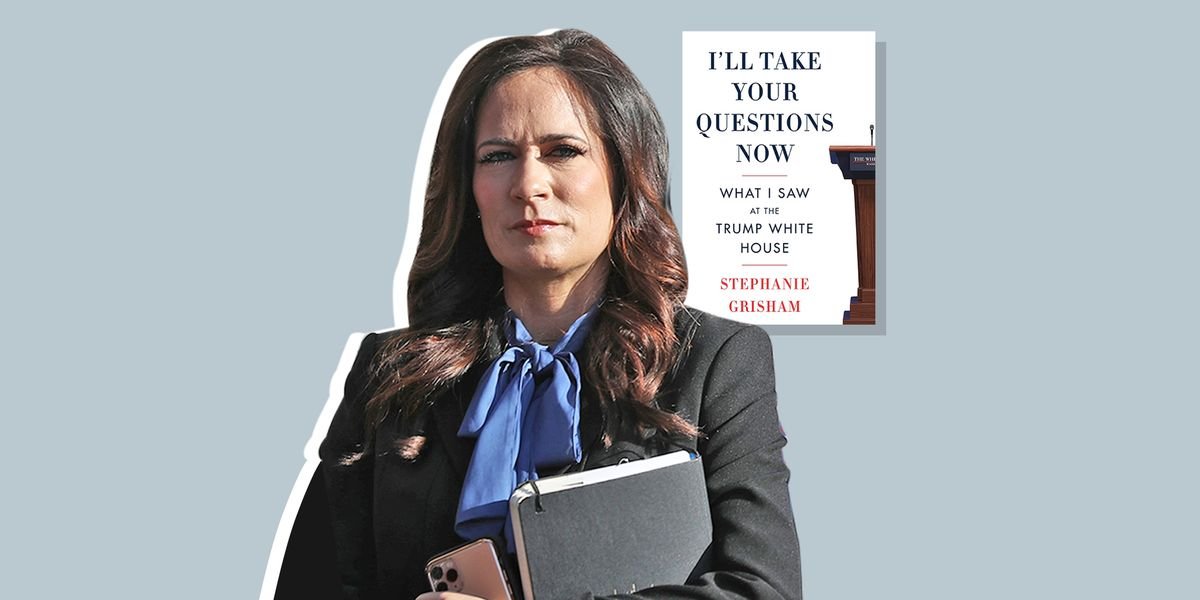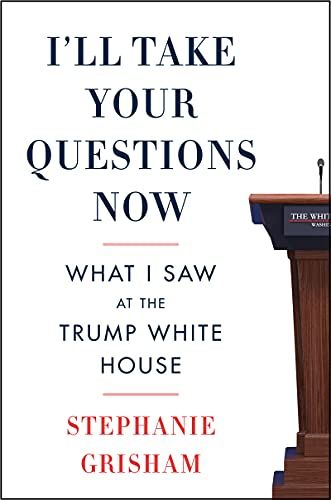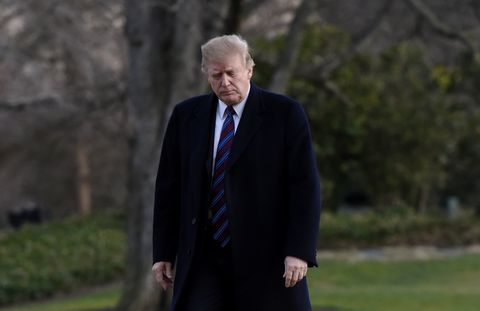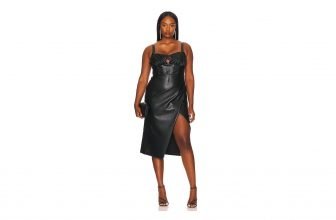
Another day, another Trumpworld memoir. The latest damning dispatch from the Trump Administration comes courtesy of Stephanie Grisham, who served various roles in the White House throughout a four-year period: communications director and press secretary in the West Wing, as well as communications director and chief of staff in Melania Trump’s East Wing. In I’ll Take Your Questions Now, her new memoir, Grisham depicts a White House “where everything was like a clown car on fire running at full speed into a warehouse of fireworks.” Caught between the president’s abusive leadership style and the conflicting loyalties she felt toward the first lady, Grisham’s final straw came on January 6, 2021, when she tendered her resignation hours into the insurrection at the Capitol.
The Trumps, for their part, have already moved to discredit Grisham. Describing Grisham as “very angry and bitter” after a break-up, President Trump said in a statement, “Stephanie didn’t have what it takes and that was obvious from the beginning. She had big problems and we felt that she should work out those problems for herself. Now, like everyone else, she gets paid by a radical left-leaning publisher to say bad and untrue things.” Melania Trump also clapped back, saying in a statement, “The author is desperately trying to rehabilitate her tarnished reputation by manipulating and distorting the truth about Mrs. Trump. Ms. Grisham is a deceitful and troubled individual who doesn’t deserve anyone’s trust.”
Grisham’s account, like any Trumpworld memoir, must be read with a healthy dose of skepticism. After all, as Grisham herself admits, “Casual dishonesty filtered through the White House as though it were in the air conditioning system.” But Grisham anticipates that readers may not take her account at face value, writing, “This is not, by the way, a book where you need to like me.” We read I’ll Take Your Questions Now in advance of publication; now, we’re breaking down the biggest bombshells below.
First up: Grisham offers insight into the daily routines of the first lady, and the derisive nickname they inspired:
I could count only a handful of times over the years that Mrs. Trump was actually in her office. She preferred to run things via text or phone calls, which initially made it hard to set an agenda and form a close working relationship. Mrs. Trump was working from home long before the country was… the First Lady kept to her rooms in the residence. That became a running joke among those who knew her. The Secret Service unofficially dubbed her ‘Rapunzel’ because she remained in her tower, never descending. In fact, some agents tried to get assigned to her detail because they knew the First Lady’s limited movements and travel meant that they could spend more time at home with their families.
According to Grisham, there was no lost love between Melania Trump and her stepchildren, particularly Ivanka Trump:
Ivanka was constantly getting into the press shots that truly should have been reserved for the president and first lady. It was yet another example of the Kushners putting themselves on the same level as the first couple, and it was unseemly. For Mrs. Trump, it was about protocol and the rules; or all of us as staff, it was about allowing her to be in her role and have the people of the United States see her representing them with dignity and class… Mrs. Trump seemed relieved to see that I shared her frustrations with her daughter-in-law, so much so that she eventually let me in on the nickname she had privately given her: ‘the Princess.’ Many times after that I would hear one of her favorite stock complaints, ‘Princess always runs to her father.’
Inappropriate behavior on the part of the Kushners earned the couple their own derisive nickname. “Because they dabbled in a bit of everything and could be precocious and self-absorbed, we in the East Wing dubbed [the Kushners] ‘the interns,’” Grisham writes. “Mrs. Trump was amused and herself used the nickname every now and then.” Tension between the East Wing and the Kushners is an enduring theme throughout the book, with Grisham continually emphasizing the conflicts of interest proposed by the Kushners’ role in the administration. Take, for example, the matter of Jared Kushner’s security clearance:
The greatest irony, of course, was when I heard that Jared Kushner never got a security clearance because of all of his issues, financial interests, and so on. As far as I know, he only ever got the most basic clearance, yet he was in all of the most important meetings of the administration. He also reached out directly to many heads of state, such as Benjamin Netanyahu and the leadership of the Saudi government, something no staffer should ever do, let alone if they had no top security clearance.
Remembering when Kushner teamed up with speechwriter Stephen Miller to write a televised address at the beginning of the COVID-19 pandemic, Grisham writes at length about what she saw as Kushner’s poisonous influence in the White House:
I had shared with Mrs. Trump many times my opinion that if we lost reelection in 2020 it would be because of Jared. She didn’t disagree with me. It was my fervent opinion that his arrogance and presumption had grown over the years, and he threw his power about with absolutely no shame. I would venture to say that being in the White House changed Jared as a person. There was no reason that he should be sitting with the speechwriter laying out our nation’s plan to fight a global pandemic. And I knew that if things went badly with the speech, which felt inevitable, he would be the first person to say in the president’s ear that the comms team had fucked it all up. He was Rasputin in a slim-fitting suit.
But the Kushners aren’t the only Trumpworld acolytes to come under fire in I’ll Take Your Questions Now. Grisham doesn’t mince words when writing about Trump sycophant Lindsey Graham:
Lindsey Graham? Well, it struck me that he was using Trump to mop up the freebies like there was no tomorrow (seems that he still is). He would show up at Mar-a-Lago or Bedminster to play free rounds of golf, stuff his face with free food, and hang out with Trump and his celebrity pals. On one occasion, I came across him at Bedminster after he’d kicked out a White House staff member so he could take her room. Senator Freeloader was sitting at a table by the pool, a big grin on his face, lapping up the goodies he was getting like some potentate. He said to me, with a creepy little smile, ‘Isn’t this great? Man, this is the life.’
Grisham, like many other Trumpworld alums, takes note of Trump’s obsession with dictators. But it’s her recollection of 2019’s G20 Summit in Osaka that’s the most chilling, suggesting an all-too cozy rapport between Trump and Vladimir Putin:
Trump would usually spend a minute or two talking about what ‘animals’ the reporters could be, and then the press would come in. With President Putin, Trump started out the same, then changed his tone. With all the talk of sanctions against Russia for interfering in the 2016 election and for various human rights abuses, Trump told Putin, ‘Okay, I’m going to act a little tougher with you for a few minutes. But it’s for the camera, and after they leave we’ll talk. You understand.’
The most interesting moments in I’ll Take Your Questions Now come when Grisham offers a look behind the scenes of memorable moments. Take, for example, her recollections about the hand slap heard ‘round the world. In 2017, Melania Trump made headlines when she appeared to slap her husband’s hand away during a diplomatic visit to Saudi Arabia in 2017. The truth, according to Grisham, is less interesting:
For those who care to know, Mrs. Trump ‘slapped’ her husband’s hand away that day because she thought it was against protocol to hold hands at such a formal ceremony. Melania was a rule follower, sometimes to a fault, and her husband knew that. He often tried to hold her hand or messed with her hands on purpose in front of the cameras to irritate her.
Grisham also delves into the Stormy Daniels scandal from 2018, remembering when Daniels sued Donald Trump over his efforts to suppress her disclosure of their affair. In the ensuing media blitz, Daniels likened Trump’s penis to a toadstool—a depiction he took such issue with that he called Grisham from Air Force One to set the record straight.
“Did you see what she said about me?” He said after a moment, referring to Stormy. Then he added, unsurprisingly, “All lies. All lies.”
“Yes, sir.”
Then I figured out exactly what he was concerned about. “Everything down there is fine,” he said.
What the hell was I supposed to say to that? I kept it to a simple “Okay,” praying that somehow we’d get disconnected.
“It’s fine,” he repeated.
Remember Trump’s mysterious visit to Walter Reed Medical Center in 2019, when protocol was disrupted and doctors were asked to sign NDAs? Grisham takes us behind the scenes there, too.
I was reminded of what had happened in the fall of 2019 when Trump had made a seemingly impromptu visit to Walter Reed National Military Medical Center. I was informed, as were a small handful of others, including Vice President Pence, of the reason for the visit. Pence was told he had to stick around town “just in case.” What I was not allowed to tell anyone at the time was that the president was having a very common procedure that all men and women over the age of fifty should have. In such a procedure, a patient is sometimes put under. In Trump’s case that could mean signing a letter under the Twenty-fifth Amendment to put Pence temporarily in charge, but the president was ultimately not put under, I believe simply so he wouldn’t have to be perceived as giving up power.
But we know the real behind-the-scenes story you want to know about: behind the scenes of Trump’s haircare routine. Grisham has got you covered:
Donald Trump’s hair, when not perfectly coiffed, was a sight to behold. There is no way to describe exactly how he styles that magnificent and very wild mane of his, but it involves a comb, a hair dryer, and a shit ton of hair spray. His hair is much longer than I had imagined, like multiple inches from end to end. He cuts it himself with a huge pair of scissors that could probably cut a ribbon at an opening at one of his properties.
That’s all for now, dear reader. We’ll see you next time there’s a Trumpworld memoir to excavate, which surely won’t be long.
Books and Fiction Editor
Adrienne Westenfeld is the Books and Fiction Editor at Esquire, where she oversees books coverage, edits fiction, and curates the Esquire Book Club.
creditSource link









I have read your article carefully and I agree with you very much. This has provided a great help for my thesis writing, and I will seriously improve it. However, I don’t know much about a certain place. Can you help me?
Your point of view caught my eye and was very interesting. Thanks. I have a question for you. https://www.binance.com/sv/register?ref=S5H7X3LP